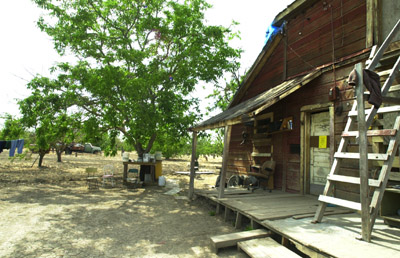
The five residents of 510 Hillcrest didn’t get paychecks for
laboring the farmland of former county Supervisor Harold Cerrato
during the past four years. Instead, Cerrato offered shelter as
compensation, which the tenants naively appreciated
– unmindful they had been living in the worst case of
substandard housing in Hollister history.
The five residents of 510 Hillcrest didn’t get paychecks for laboring the farmland of former county Supervisor Harold Cerrato during the past four years. Instead, Cerrato offered shelter as compensation, which the tenants naively appreciated – unmindful they had been living in the worst case of substandard housing in Hollister history.
“He would never pay them,” said city planner Maria De Leon. “He would just let them live there. That was the exchange. That was the compensation.”
On Wednesday, the city condemned the four-unit house and issued checks to its residents – from Cerrato – totaling $8,064. The tenants must be out within three days, as the house has been posted as “Unsafe to Occupy.”
A Hollister ordinance adopted in early January forces negligent landlords of city-condemned properties to pay relocation costs of tenants forced to move. In this case, the city deemed $8,064 to cover the next three months rent – an amount derived from the federal government’s “fair market rents” for the county, said Tim Burns, code enforcement officer with Hollister.
Since the city’s initial inspection of the substandard house and confrontation with Cerrato three weeks ago, the Spanish-speaking tenants have informed housing officials Cerrato, a farmer and developer, has “worked them like dogs” – and without pay, Burns said.
De Leon, who has translated the tenants’ discussions with the city, said Cerrato has allegedly been transporting them to and from his orchards more frequently during the past three weeks.
The five tenants, originally from Mexico, range in age from 32-67. Of the five, just two are related – father and son Crescencio and Jesus Coria – and all are migrant farm workers who have lived in California for the past 20 years.
Each of them has found a new home in the area – one with his family member, another with a friend’s family and two at a home near Pacheco Pass Highway, according to officials.
“We’re really excited when situations like this end up with a well-deserved compensation,” said De Leon, who was at the condemning and previous inspections. “We were able to provide them with something for their suffering.”
Cerrato, 75, was a supervisor from 1977-85. Since 1957, he has lived at a home on the same 45-acre plot – about 200 feet from the condemned house.
On May 27, housing officials and Fire Marshal Mike O’Connor inspected the property. Burns said they were shocked at the gross inhumanity of the home, which included an outhouse as the only bathroom facility and many other hazardous code violations. Cerrato was not at that inspection.
Officials returned the following day to warn the tenants the house would be condemned and to inform Cerrato of the imminent penalties. Officials told Cerrato he would be required to pay the relocation fee and destroy or refurbish the house.
“Force me to pay?” Cerrato said during the encounter. “You’re full of bullshit!”
Two weeks after the inspection and confrontation – to the dismay of housing officials – Cerrato and his lawyer John O’Brien approached the tenants and requested they sign a document that would waive Cerrato’s obligation for the relocation fees.
Jesus Coria, the youngest of the five, immediately went to the Planning Department office and told housing officials Cerrato had asked the tenants to endorse the waiver. Burns said he “strongly advised” them against signing the papers, a recommendation the tenants followed.
Cerrato declined to comment this week on the matter, including the waiver. O’Brien, however, confirmed the tenants were asked to sign a waiver.
“Yes, they were given that opportunity,” O’Brien said. “They were not forced to do it.”
After the tenants’ refusal, Cerrato paid the fine on June 12. But he did it “under protest,” according to Burns. Cerrato had legal reasons for challenging the penalty, according to O’Brien, who would not discuss it further.
And contrary to the tenants’ allegations the substandard housing was Cerrato’s only compensation for the work performed at his orchards, Cerrato has claimed he paid them for their labor.
“That is the allegation (from the tenants),” O’Brien said. “That is a bare allegation.”
Hollister officials do not investigate allegations of labor exploitation, according to City Attorney Elaine Cass. However, state agencies and California Rural Legal Assistance, Inc. do inspect such cases.
The CRLA’s Salinas-based lawyer Mike Meuter could not be reached for comment.
Although Cerrato paid the relocation fees, the city is not done with the case. Next, officials will oversee efforts to return the building back to code.
The house – blighted with no running water, a roof made of tarp and cardboard, a stove powered by propane tanks, a flawed electrical system and many other hazards – will be demolished and rebuilt as a shed, according to Cass.
Burns said it is the worst case of substandard housing he has seen in his 22 years of law enforcement. Despite the conditions, the tenants “still feel really bad about having to receive the compensation,” De Leon said.








